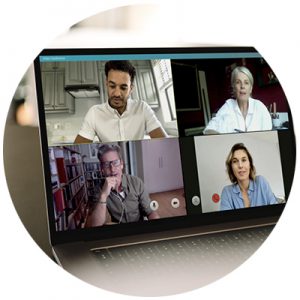Workplace accommodations make it possible for people with disabilities to efficiently and successfully do the job. We at Employment Services have supported people with a variety of accommodation needs including assisting clients with low vision to purchase appropriate screen reading software, ASL and Intervenor interpretation on worksites, assisting with flexible work hours/breaks schedule, job modification and accessible workstations. Typically, the average workplace accommodation for a person with a disability costs the employer less than $500. and our team has worked with businesses of all kinds to help make people transitioning into jobs as seamless as possible.
For myself, I have never considered the idea of an accommodation. Probably the only situation close to that was when I lived in Chicago with three young children at three different schools/daycares and needed to leave my office by a certain time to avoid the $1 a minute (US dollars!) late fees, which can add up quickly. This wasn’t considered an accommodation at the time, just a request, which most days was completely doable but due to the nature of my job, there were a few days where back-up plans needed to be in place. I remember the panic of trying to organize these things when there was an emergency at work. The idea of not being able to effectively do my job was difficult and upsetting. But that was a long time ago.
At the beginning of March 2020, I was living with my 17-year-old daughter who was finishing her last year of high school. She spent 95% of her time in her room and I pretty much had the house to myself. We had an abundance of space and were ignorantly blissful in our mundane lives. Within a few short weeks, the world changed for everyone. For us it meant the return of my two older sons. The house soon became chaotic, crowded and small. And no one was leaving to go anywhere. It was all us, all the time. Fun at first, then a little less fun….
The day came where we were told we would not be working from the SCIO office and it was time to set ourselves up at home. My first thought was, “Yay, sleep in!!” But I quickly came to my senses and thought about the nature of my job and how I value face-to-face contact and being with someone rather than using a phone or video call. There is depth that gets missed when people can’t look into each other’s eyes, read body language, posture etc. I was concerned about how to maintain a connection with my clients. The ability to learn and consult with my colleagues on a day-to-day basis is something that I also value and knew it would be missed.
 I set myself up on the dining room table, where it seems my three kids had already staked out a place for themselves. One had recently launched his own start-up business, another was finishing his last year of university and the other was finishing her last year of high school. It became obvious that we all had work to do around the dining room table. No one was too interested in hosting Zoom meetings from their bedrooms or bathrooms, and I guess being around the dining room table made sense.
I set myself up on the dining room table, where it seems my three kids had already staked out a place for themselves. One had recently launched his own start-up business, another was finishing his last year of university and the other was finishing her last year of high school. It became obvious that we all had work to do around the dining room table. No one was too interested in hosting Zoom meetings from their bedrooms or bathrooms, and I guess being around the dining room table made sense.
Day 1 of work from home got started. Our laptops were all charged up and ready to go. Within minutes I was told to, “Shhhh” while I was on the phone. It seems that is not feedback I appreciate and found myself getting irritable. This is not my first time working in a “group office” but I never had this response before. I had my own issues concentrating as well and would take client calls outside (March was a cold month and difficult to take notes with my mitts on). I would watch my kids work while Snapping, YouTubing, Tik Toking at the same time and felt they needed to know that that wasn’t a great work ethic. Apparently, they weren’t fond of my feedback either. When I returned to work on Day 2, my son had put a Post-it note on my computer saying, “Aaron’s office. Please leave.” This was becoming a hostile work environment and clearly it was not going to work.
I set myself up in the kitchen, the kids started doing their Zoom meetings and phone calls in the basement (apparently, I wasn’t the only annoying one sitting around the dining room table). I started a Zoom support group to connect with clients, I adjusted to making more phone calls and emails to reach out to both clients and colleagues and set up some rules and boundaries about sharing this public workplace that we called home.
Our new-found offices and work arrangements didn’t come without challenges. Having one of my adult kids ask me, “What’s for dinner?” while I’m clearly on a Zoom meeting was especially irritating. There was the time the dog decided it was dinnertime at 3:00 in the afternoon and, after much barking, I literally had to feed her so she would stop hitting me with her paw (not a good look on Zoom). And as much as I try to visibly ignore some of the chaos that is going on around me to keep things professional, I know some clients from my support group will recall when the tree-removal pro at my neighbour’s knocked on my glass back door (with his saw!!) which happened to be right where I was sitting. I screamed loudly and literally jumped out of my chair!
To balance things out a bit, I guess my kids did not realize their new household chore is official Geek Squad to my many tech issues. One of the many rules we (I) established is to come running when you hear the words, “Oooh nooo, my Zoom has disappeared!” And I’m pretty sure my son who is working on Pacific Time may not enjoy his mom bellowing from the top of the stairs, “DINNER!!!” while he’s on his Zoom meetings.
My point is that concessions, accommodations and adaptions have had to be made by everyone. This is a daily reality for everyone, but during these times, compromise and re-adjustment can be more difficult. We have experienced huge changes and loss at such a rapid pace with COVID-19 and have had to navigate so many unique experiences. I’m hoping in the end we can come out of this with more patience, empathy and an intact sense of humour. The way this situation has progressed has taken away our sense of control, but it’s important to remember that we always have control over the way we choose to deal with what comes our way. To quote The Tragically Hip’s Gord Downie, “No dress rehearsal. This is our life.”






